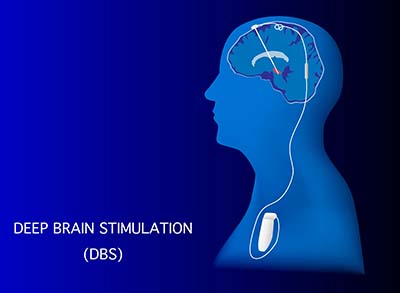Good Candidates for Deep Brain Stimulation

Deep brain stimulation (DBS) is a surgical procedure that involves precisely placing electrodes into very specific areas deep in the brain. These electrodes in the brain are connected to a pacemaker (called an implantable pulse generator or IPG) that is implanted into the chest. The pacemaker delivers electrical impulses to the brain through the attached electrodes. These impulses target deep circuits within the brain and will help to regulate any abnormal brain activity that may be occurring.
Deep brain stimulation (or DBS) can be used to treat a variety of conditions and disorders that are caused by abnormal brain activity like Parkinson’s disease, essential tremor, and dystonia. The generator can be programmed to address the specific needs of individual patients in order to provide the best possible results. However, there are certain factors that need to be considered when determining if someone is a good candidate for deep brain stimulation.
Is Deep Brain Stimulation Right for Me?
Deep brain stimulation is most commonly used to treat essential tremor and Parkinson’s disease, though it can also be approved for the treatment of epilepsy, obsessive-compulsive disorder, and dystonia. While deep brain stimulation can be an effective option for many patients, it should only be considered after patients have attempted to treat their conditions through medications, non-invasive treatments, and other first-line therapies.
In patients who suffer from Parkinson’s disease, deep brain therapy may be considered in cases where medication may prove to be an effective treatment option but leads to the development of other issues like dyskinesias and dystonia. Deep brain stimulation is also considered in patients with Parkinson’s patients with a tremor that does not respond to medications.
In patients who suffer from essential tremor, deep brain stimulation is often considered when the patient experiences tremors that are debilitating and do not respond to medications, espeically propranolol and primidone.
It is also important to remember that while deep brain stimulation can provide significant relief from the conditions being treated, it is not a cure for Parkinson’s disease or essential tremor. Candidates for deep brain stimulation should have realistic expectations regarding the results that are possible through the procedure.
Is Deep Brain Stimulation Safe?
While deep brain stimulation is a safe and effective treatment option, there are certain risks associated with the procedure. The most significant risks are:
- Stroke
- Bleeding
- Infection
Around 1 in 200 patients will experience bleeding or a stroke that may cause permanent changes to their neurological symptoms. Strokes can affect movement, speech, memory, balance, ability to walk, and ability to swallow following deep brain stimulation. The risk of infection is relatively low at 3-4%. In most cases, successful treatment of a deep brain stimulator infection requires removal of the system. The system can be reimplanted after successful treatment of the infection.
Scheduling a Consultation
If you are considering deep brain stimulation as a treatment option, it is important that you choose a skilled and experienced neurosurgeon who can provide you with the best possible care and results.
Dr. Nader Pouratian is a renowned expert in the field of neurosurgery who emphasizes the importance of patient-centered care. Our entire team is focused on providing personalized care based on the unique needs of each individual patient. Contact our office today to schedule a consultation for your deep brain stimulation.



